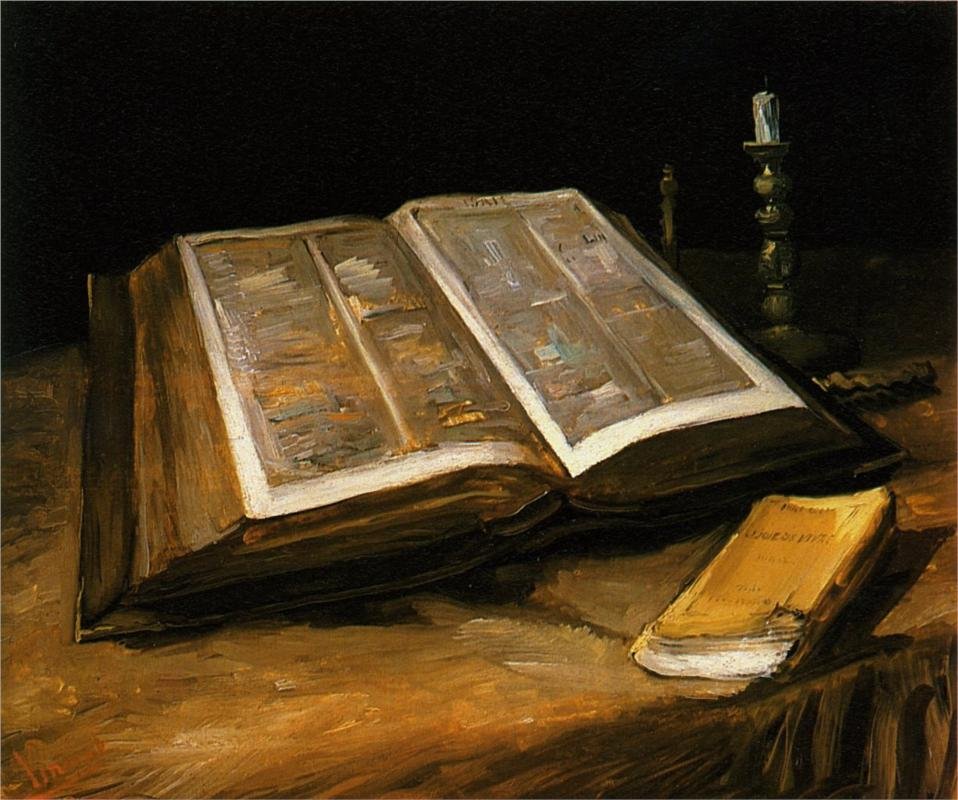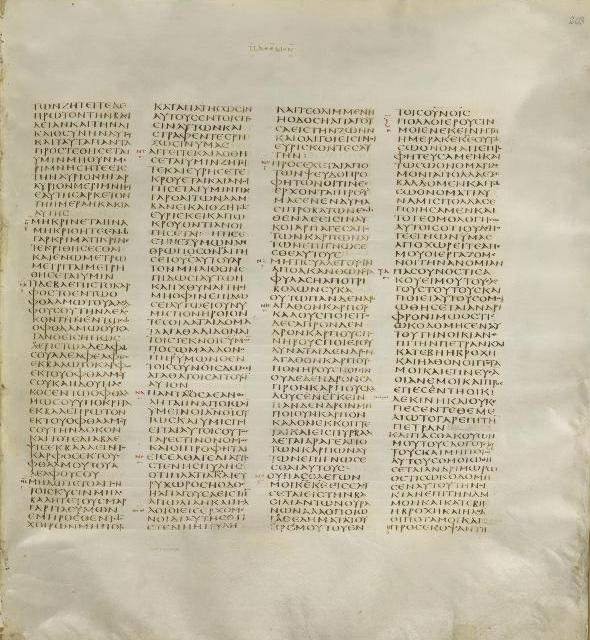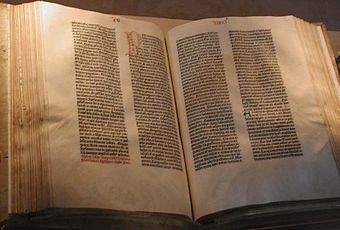The following is a response to John Bugay’s review of Canon Revisited: Establishing the Origins and Authority of the New Testament Books by Michael J. Kruger, in which John announces, “Attention Roman Catholics: ‘Sola Scriptura’ is in the Bible.” It proved too long for his comment box, so I thought I would put it in full here.
Hi again, John. Thank you for pointing out this review. I haven’t read this book yet, but thanks to a recent Amazon giftcard from my brother (also named John), I intend to give it top priority.

Catholics are “helpless” to interpret Scripture without the Church?
I’d like to respond first to this paragraph above that stuck out to me like a sore thumb:
To be sure, some Roman Catholics pay some lip service to Scripture. It’s “in there”, among the legs of the stool. But in practice, for Roman Catholics, the Bible has no intrinsic authority as the Word of God. That is, even though God may speak, still God’s very Word is helpless to communicate its message without the “interpretation” of the Roman Catholic Church. …
Speaking of “caricatures”: This is a rather crude one, and flatly contradictory to the Church’s own teachings on Scripture. I’d encourage you to read the whole of Chapter III from Dei Verbum, the Second Vatican Council’s Dogmatic Constitution on Divine Revelation; but for here, a few quotes:
“Since God speaks in Sacred Scripture through men in human fashion, the interpreter of Sacred Scripture, in order to see clearly what God wanted to communicate to us, should carefully investigate what meaning the sacred writers really intended, and what God wanted to manifest by means of their words. …
“In Sacred Scripture, therefore, while the truth and holiness of God always remains intact, the marvelous “condescension” of eternal wisdom is clearly shown, “that we may learn the gentle kindness of God, which words cannot express, and how far He has gone in adapting His language with thoughtful concern for our weak human nature.” For the words of God, expressed in human language, have been made like human discourse, just as the word of the eternal Father, when He took to Himself the flesh of human weakness, was in every way made like men.” (Excerpted from Dei Verbum 12, 13)

Does giving guidance and direction to “interpreters” in how to “see clearly what God wanted to communicate to us,” “expressed in human language … like human discourse,” really suggest the idea to you that to a Catholic, “God’s very word is helpless to communicate its message”? Surely you are aware that the magisterium of the Church has actually given authoritative interpretations of a relatively minuscule portion of the whole corpus of Scripture. Do Catholics, then, consider the rest of God’s Word in Scripture, where the Church has not spoken, “helpless” to communicate to them? Are Catholics “helpless” to read and interpret Scripture for themselves? Like so many Protestants — and like I did myself, when I too was a Protestant — you seem to mistake the role of the Church’s magisterium for that of a dictator rather than a teacher. It is a poor teacher who dictates every rote fact to her student but never teaches him to think or function for himself, and it is a poor student who never learns anything more than to parrot his teacher’s answers! The Church’s role and mission is to guide and raise up healthy disciples of Christ, not blind, mindless, and helpless sheep. Like a good teacher, the magisterium teaches not only divinely-revealed truths, but approved principles, methods, and guidelines: and within those guidelines, the Catholic exegete is equipped and encouraged to listen to and interpret God’s Word for himself. The Church has spoken authoritatively to teach the truth of the Gospel as Jesus charged, particularly in scriptural matters where uncertainty has arisen; but the Catholic believer is free and entitled to his own opinion in any matter on which the Church has not given an interpretation.

Protestants are “helpless” to have any certainty in interpreting Scripture
I would submit, actually — speaking from my own experience — that the Protestant exegete is absolutely helpless to arrive at any meaningful certainty or confidence regarding the interpretation of Scripture. For all the talk of “due use of ordinary means” — the man out to sea with a boat-full of “ordinary means” is nonetheless out to sea. “Ordinary means” (e.g. lexica, grammars, commentaries) are nonetheless human means; and my “sufficient understanding” is nonetheless a human understanding. If, by my fully-informed, “sufficient understanding,” I disagree with the “sufficient understanding” of someone else whose faculties and authorities I respect — which is bound to happen, and obviously has — how can I have any confidence at all that I have the correct and proper understanding? It is arrogance and hubris — an exaltation of of my own human understanding and that of others — to assert, as I’ve seen so many Protestants, particularly in the Reformed camp, assert, that my human understanding is the only one that “anyone in his proper mind” could come to. On what is such certainty based, other than prideful self-aggrandizement and self-assurance?
As an academic, and a human one, I must accept that other reasonable people can disagree with me and arrive at different, and reasonable, conclusions than mine. And regardless of how convinced I may be of mine, I must always accept that because my reasoning and interpretation are human and uncertain, so is my conclusion. This is not the character of the Christian teaching I witness in Scripture: which was taught authoritatively by divinely-appointed Apostles and teachers, and accepted as the direct Word of God Himself. There is no indication in Scripture of this Word being submitted to “interpretation” or “deduction” or “ordinary means” or “sufficient understanding”: if there were any doctrinal question, the resort was to the judgment of these authoritative teachers, not to common, human interpretation of the message’s meaning. And when these teachers spoke, their voice was clear, authoritative, and certain: and this is a certainty I do not find today in the Protestant paradigm, nor can I find it in any degree of smug self-assurance of my own reasoning.

Is “Sola Scriptura” in Scripture?
What I also do not find in Scripture, despite your assurance that it is there, is the Protestant doctrine of sola scriptura. Now, it is entirely possible that I am one of those who caricature that position, and if that is the case, I humbly ask you to correct me. But by the Protestant teaching of sola scriptura itself, as I find it presented in the Westminster Confession, “all things necessary for [God’s] own glory, man’s salvation, faith, and life, is either expressly set down in scripture, or by good and necessary consequence may be deduced from scripture”; and, “nothing at any time is to be added, whether by new revelations of the Spirit, or traditions of men” — in other words (and if I am in possession of a caricature, it surely must be in this understanding): all doctrine to be believed by the Church is either plainly stated in Scripture, or implied by necessary consequence; and no doctrine can be added from any source to what is plainly stated or necessarily implied in Scripture. The problem is, I cannot for the life of me find these doctrines either “expressly set down [or] by necessary consequence [implied]” in Scripture. How, then, can sola scriptura be said to be in Scripture? And how can it not be self-refuting if, as a “necessary” doctrine taught by Protestants, it can’t be found in Scripture? I wrote a recent post on these questions. I would appreciate it if you read it and gave it an honest critique.

The canon of Scripture: “Self-authenticating”?
Regarding the canon: As I said in my other comment, you pounced on my one throwaway comment out of context and ignored the rest of my statements. For the sake of reference, let me paste a little of what I said there:
As Catholic apologists often present, Protestants cannot appeal to the authority of Scripture alone without first accepting the canon of Scripture as declared by the Church — and this is true. But is it that declaration of the canon that makes those texts scriptural, for a Catholic? Before any formal declaration of the canon of the Scripture, were Christians unable to appeal to Scripture? No, of course not — because such declaration defined the canon; it did not bestow some “divinely inspired” status on texts otherwise presumed to be human.
(For that matter, the Church for the most part declared a truth that had already been accepted sensu fidei fidelium for centuries: the canon was only defined for the sake of a few books whose scriptural authority was disputed. The canonicity of the majority of books was a self-evident truth to most Christians. This does not mean that the canon as a whole was “self-authenticating” — it certainly wasn’t.)
As I made clear there, I completely agree that with regard to most of the books of the scriptural canon, the books’ divine inspiration, apostolic origin, and scriptural nature were readily, at an early date, and universally accepted. But this idea of unanimous consensus and immediate acceptance certainly can’t be applied to all the now-canonical books of Scripture, nor to the conception of a unified, universal “canon.” Consider, for example, 2 Peter, which by all appearances, nobody prior to Origen and Eusebius in the third century had ever heard of, and they considered its authenticity and inspiration doubtful. Or, books such as 1 Clement, the Shepherd of Hermas, or the Epistle of Barnabas, which some included among their early compilations of Scripture, such as Codex Sinaiticus, and other Church Fathers quoted from as scriptural authority. Or, consider that no sooner than Protestant sentiments were breathed, the so-called “self-authenticating” canon of Scripture was open again to question: Luther himself designed to dismiss the Epistle of James, as well as Hebrews, Jude, and Revelation. Did those books not “self-authenticate” to him? Or was his judgment not in accord with those “of proper mind”? And of course, Luther succeeded in excising seven books of the Old Testament that had previously been declared canonical. And Protestant scholars ever since have considered the canon “fallible” and seen it fit to question the authenticity and canonicity of various books. And yet you insist that the canon is “self-authenticating” and rests on something more authoritative than fallible human reason and judgment? The very facts of Protestant history contradict this statement.
The fact that Protestant apologists so easily gloss over with regard to the canon is the plain fact that, regardless of any “self-authentication,” the traditional canon declared by the Catholic Church is the starting point, and (with the exception of the Old Testament deuterocanon) usually the ending point, even for Protestants today. It’s easy to declare that one knows the answer when it was declared by someone else centuries ago. Whether they like it or not, Protestants do inevitably depend on the Church’s declared canon, epistemologically: One can’t very well un-know what is already known and accepted; and any argument about whether or not one could have known it otherwise is a moot quibble. And yet, given the fact that Christians questioned and doubted a number of scriptural books both before the Church’s declaration of a universal canon and after Protestants denied the Church, I tend to doubt that anyone ever really had certainty as to a complete and closed canon without the Church’s declaration — or would have any today. I observe that putting five Protestants in a room usually results in six or seven opinions, on any given matter: so I very much doubt that, if the canon hadn’t already been declared as a starting point, Protestants could have reached any meaningful agreement at all concerning it. Likewise for Christology, the Trinity, and every other doctrine hammered out by the toil and tears of centuries of early Christians whose heritage Protestants take for granted.
It seems to me that so much of Protestant rhetoric is aimed at dismissing Catholic claims of the Catholic Church being an authoritative interepreter and guide to Scripture with one hand, while with the other advancing the thesis that the individual, fallible believer has access to some other, concrete, authoritative and infallible interpretation of Scripture — one that, apparently, is self-evident and “self-authenticating” from Scripture itself and Scripture alone, to “anyone of proper mind.” But one can’t hold both at once. Scripture does not interpret itself, and submitting it to fallible human reason by necessity yields a fallible and uncertain human interpretation.
God bless you for your thought on this matter, and may His peace be with you!
Funny I have just did a look through the Bible specifically looking for the Bible to say something about it s authority being the only authority and even as a Protestant I couldn’t find it. The authority of Scripture is simply too complicated to leave to a simplistic notion as Sola Scriptoria. Good to see you writing again.
Thanks, Ed. I appreciate the comment. It’s nice to hear from you, too. 🙂 God bless you.
It is interesting that Protestants rely on Catholic Tradition as much as any Catholic in deciding which books are canonical. I had never heard of the concept of a text being “self-authenticating.” That strikes me as irrational.
As you remarked on, my main problem with most Protestant arguments against Catholic doctrine is that they very often argue against caricatures and exaggerations which Catholics themselves do not believe. (St. Francis de Sales says it very well in the quotation I placed here: http://medievalotaku.wordpress.com/2014/05/13/the-spirit-of-st-francis-de-sales/)
Thanks for the comment! Yes, it’s irrational, and I have a very hard time even understanding the reason it pretends to be rooted in. And I have the same problem. God bless you!
Joseph – of course I have read Dei Verbum.
You take issue with my statement that “God’s very Word is helpless to communicate its message without the “interpretation” of the Roman Catholic Church…” But perhaps you have not yet read enough to understand what Roman Catholics are really saying about Scripture.
Here is the bottom line:
For as important as they say that Scripture is (and they have some pretty highfalutin things to say about it), it’s only as good as the lens that Rome provides to enable you to benefit from it. Here’s the cash-money statement: “all of what has been said about the way of interpreting Scripture is subject finally to the judgment of the Church, which carries out the divine commission and ministry of guarding and interpreting the word of God”.
In the end, in the Roman Catholic schema, you may think whatever you want to think about Scripture, but only Rome’s “interpretation” is truly valid.
This of course has been expressed in other places. For example, here’s Scott Han (“Covenant and Communion”), citing Ratzinger:
Of course, God’s Word couldn’t have those qualities apart from the Roman Magisterium. God is too helpless without their “interpretation”.
That’s not Hahn; that’s Hahn citing Ratzinger. It’s pretty horrifying stuff to me – the God of the Universe, who created things by speaking them into being, can’t, in his “Word”, effectively communicate anything without the aid of the almighty Roman Magisterium.
So is my statement actually a “caricature” – I think not. Given that Ratzinger became a pope, I think it is reflective of “the Church’s own teachings on Scripture”.
Hello, John! Thanks for stopping by, and welcome to my humble corner of the Web.
Did you not even read my post? Did I not explicitly address this above? How can “only Rome’s interpretation [be] truly valid” when the Magisterium of the Church has only spoken authoritatively on bits and pieces of it? Are the Catholic faithful then “helpless” to hear from God? No, in fact, it’s because they are not helpless that the Magisterium hasn’t spoken on more of Scripture.
This is not what Dei Verbum, or Hahn, or Ratzinger, or anybody, even said, and your very reading is contradicted by the reality of Scripture in the life of the Church. God communicates, through His Word, every single day, to hundreds of millions of people, while the Magisterium only gets together to talk about it every fifty to five-hundred years or so. Does this seem like any kind of overburdening dependence on the Magisterium’s dictates to you?
God bless you, and thanks for commenting!
Joseph, I’m not sure if you’ve seen it, but I’ve responded to your response, and elaborated here.
John, I did (I received the trackback). I hope to respond to you sometime today. God bless you, and His peace be with you!
God Himself instruct John to canonize the scripture:
Rev 22:18 For I testify unto every man that heareth the words of the prophecy of this book, If any man shall add unto these things, God shall add unto him the plagues that are written in this book:
19 And if any man shall take away from the words of the book of this prophecy, God shall take away his part out of the book of life, and out of the holy city, and from the things which are written in this book.
Thanks for the comment! “This book,” in that case, though, refers to the Revelation of John, not to any canon or collection of Christian writings, of which he had no notion at that time.
no. it’s not coincidence that John is the last living apostles.
and it’s not coincidence that his book is the last book of the new testament.
i dont think other books (from genesis to jude) can be added/substracted??
the word ‘canon’ was never mention at that time.
but the final and complete bible was already there.
No, I’m afraid not. The Scripture, as you yourself quote, forbids the adding to or taking away of words from this scroll (βιβλίον). There was no concept of a complete “bible” — which is a plural word, βιβλία or biblia, that is, scrolls. The canon of the New Testament — which books to include and which to reject — was still being debated openly in the fourth century A.D. See, for example, the testimony of St. Augustine (an authority even most Protestants accept), on this, the website of a Protestant researcher:
http://www.bible-researcher.com/augustine.html
If the “final and complete bible” were accepted and established in the first century — then why did Martin Luther and the Protestant Reformers remove seven books in the sixteenth century — and seek to remove even more? In particular, Luther wanted to remove James, Jude, and Revelation.